We use cookies on this website. Cookies help us deliver the best experience on our website. Read about cookies.
-
- My Studies
- My Studies
-
- New student
- New student
- Malmö Smart Start Guide
- Schedules
-
- Book group rooms and find your way around Campus
- Book group rooms and find your way around Campus
- Codes of conduct
- Amphitrite
- Exams
- Registration, certificates & administration
- Withdrawal and leave from studies
- Applying for credit transfer
-
- Rights and responsibilities
- Rights and responsibilities
- Your studies and AI
- Harassment and discrimination
- Scholarships for current students
On the page -
- Student Services
- Student Services
-
- Writing Centre and support
- Writing Centre and support
- Take-home exams and written assignments
- Maths workshop
- Student Health Services
- Study guidance
- Studying with a disability
- University Chaplaincy
On the page -
- Jobs and internships
- Jobs and internships
-
- Innovation and entrepreneurship
- Innovation and entrepreneurship
- Leapfrogs
- Internships
- Career guidance
- Vertically integrated projects (VIP) programme
On the page
Malmö Smart Start Guide
Start Guide
Everyday hacks for living well and responsibly in your new city. Join a community of like-minded people, find cycling routes and second-hand furniture, learn tips for saving food and where to hike.
Your guide to smarter student living
As a student in Malmö, you’re not just arriving in a new city, you’re stepping into a community that values sustainability, innovation, and shared responsibility. Whether you’re here for a semester or your entire degree, this guide will help you make conscious, informed choices from day one. By sharing ideas and habits that promote sustainable living, we’re building a network of global changemakers, starting right here in Malmö.
Malmö City Smart Map
Malmö City Smart Map
Malmö City Smart Map
Malmö City Smart Map is a digital platform that makes it easier to find things to rent, share, exchange, borrow, give away, or receive in Malmö. Much of the content featured on the map is free and community-driven. The aim is to support those who wish to live more sustainably at a lower cost or simply want to discover and enjoy some of the city’s hidden gems. Tip: use the Swedish version with a translation tool for more options.
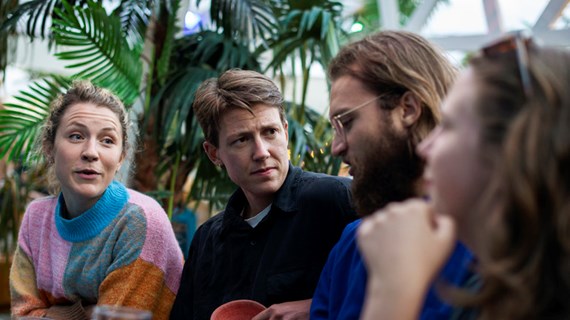
Community
Community and activities
Community and activities
Although it might be hard to gain a sense of community in the beginning, Malmö has many clubs and associations you can join. Malmö University offers a pre-arrival hub via the Unibuddy app to connect with other students beforehand. There are also Whatsapp and Facebook groups. By becoming a member of the student union, you can also engage with the student societies that exist within Malmö University.
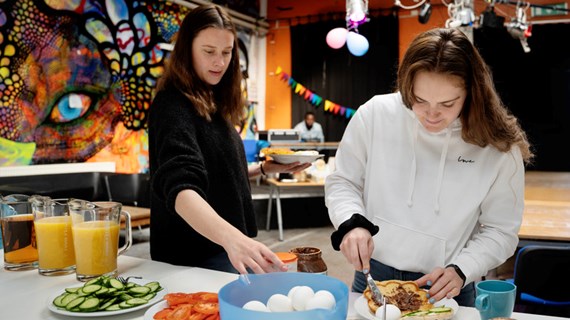
Social environment
Associations in Malmö
Associations in Malmö
The Malmö City Register of Associations is the perfect place to begin your search for groups, clubs, or sporting leagues to take part in. While most association names are in Swedish, you can easily use a translation tool to explore the range of organisations out there for you to join.
International events
International events
Malmö has a huge international community and a large selection of activities and goings on are collected under something called ‘Öppna Malmö’. Events range from art installations to historical presentations about the city’s long history of diversity. You can use a translation tool to read about all the events listed there.
What to do in Malmö
What to do in Malmö
Find ways to explore the city and what it has to offer. Below are just two examples of where to get information about what's going on in Malmö.
Social environment continued
Outdoor gyms and sports
Outdoor gyms and sports
There are three outdoor gyms in Malmö, with basic equipment. If you are looking for a specific sports activity, or to rent equipment that you may need for hiking, try searching the Smart Map for your preferred sports activity. At Fritidsbanken you can borrow sports shoes, clothes and equipment to try out a new sport or engage in the one you already know. It's free for 14 days.
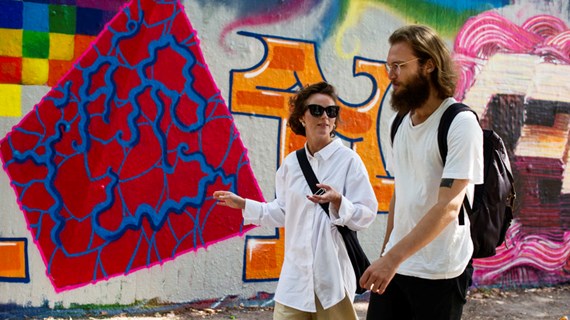
Libraries
Libraries
Libraries
Malmö has a fantastic selection of libraries spread out through the city and signing up for membership is free. At the library, you can take part in a range of activities, such as story time for children, book groups, and interviews with writers. You can get help with homework and practise your language skills. You can study – alone or in a group – and get to know others.
At the library, you can also ...
At the library, you can also ...
Borrow and read books. Read newspapers. Use computers or WiFi connection. Print, scan and copy documents.
Getting around in Malmö
Getting around in Malmö
Getting around in Malmö
Malmö is a growing, increasingly densely populated city, and its mobility policies are designed to make walking, cycling, and public transport the preferred choices for moving people and goods around the city. Malmö has invested more in cycling infrastructure than any other city in Sweden, and 26 percent of all journeys are made by bicycle. With over 560 km of cycle paths almost any city destination can be reached by bike in under 20 minutes.
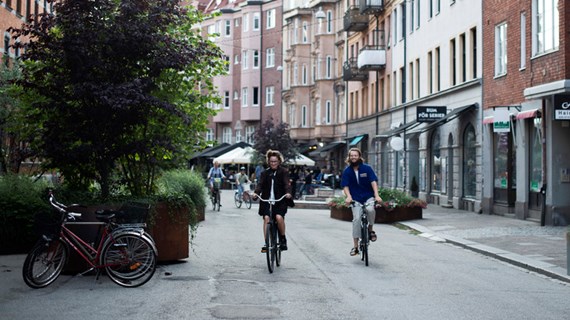
Travel locally by train, bus, bike and car
- Follow local cycling rules and prioritise safety throughout the year. Winter cycling can be challenging, but many Malmö residents cycle year-round, even during the occasional snowy day.
- Combine longer journeys by taking your bike on the train. Within the Skåne area, bikes travel free of charge on Öresundståg and Pågatåg trains as long as you have a regular passenger ticket.
- Bike & Ride garages are located next to major stops including Hyllie, Triangeln, Kronprinsen, and Malmö Central Station, making it easy to switch to public transport.
- Bus and train tickets are purchased via the Skånetrafiken app. The app allows you to lend your monthly travel pass to someone you know and take turns using it – perhaps cutting your commuting costs in half.
- Car sharing is widely used and convenient for things like moving furniture or shopping trips.
Repair, restore or re-sale
Home furnishings & tools
Home furnishings & tools
Borrow, pick up, or rent furniture from services such as Cohabit. Rent tools and other gadgets at Hygglo. Buy second-hand at flea markets or auctions. Pop-up Returen is a place where you can recycle. drop off or pick up items such as furniture for reuse. Opening times are available in English on the website.
Bicycles
Bicycles
At Cykelköket (Bicycle Kitchen) you can repair your bicycle yourself with the help of their volunteers and tools, free of charge. Buy a second-hand bicycle at ReBike, Cykeloutlet or Malmö City auctions.
Clothes
Clothes
Need a repair? Local tailors and services like Repamera can help. Host a clothes swap with friends or housemates or start a “travelling bag” of clothes to share with others. Sell clean, good-condition clothing at local flea markets. Donate unsold items to second-hand shops. Pop-up Returen is a place where you can recycle, drop off or pick up items such as clothes for reuse.
Food
Sustainable food choices
Sustainable food choices
In Malmö, sustainable and organic food practices are the norm. Public schools serve free meals with 86 per cent organic ingredients, and many locals take pride in avoiding food waste – whether that means saving leftovers or taking the last biscuit.
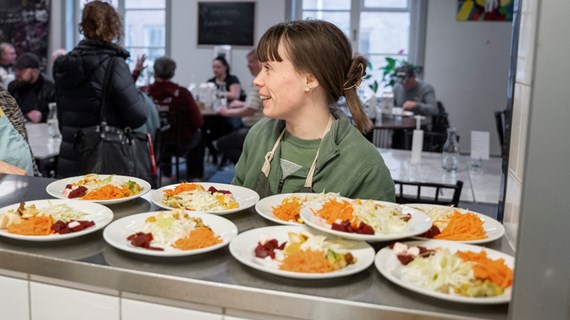
Saving food on a budget
- Explore all food-related links on the Smart Map.
- Bring a meal to campus – the University buildings all have kitchen units where students can warm food.
- Plan your meals weekly and use a shopping list to save money and time.
- Serve smaller portions to avoid waste.
- Only brew as much coffee as you’ll drink. Leftovers? Freeze into ice cubes for iced coffee.
- Freeze leftovers or extra ingredients, most foods can be frozen.
- "Best before" doesn’t always mean "bad after" – use your senses before binning it.
- Dedicate a fridge shelf for food that needs to be eaten soon.
- Eating out? Ask for a doggy bag to take home your leftovers.
How to become a food rescuer
- Choose short-dated items in shops if you plan to use them quickly.
- Join food rescue initiatives like Rude Food or Svinnbruket.
- Use apps like Too Good To Go and Karma to buy surplus food cheaply.
- Make broth from vegetable scraps or seafood trimmings.
- Shop for vegetables at the market just before closing, for great deals and reduced waste.
- Learn how to ferment and preserve food as an alternative to freezing.
- Join Malmö People’s Kitchen (Folkets Kök) and help them cook and serve free meals as a volunteer.
Clothing for all seasons
With four seasons and a coastal climate, Malmö’s weather means your wardrobe will need to adapt. Remember, the most sustainable garment is the one you wear, love, and keep – whether it’s a woolly jumper or a Batman onesie.
Taking care of your clothes
- Find local options on the Smart Map for clothes.
- Choose pieces you’ll wear for years, not just one season.
- Wash less often and only when needed – airing or spot cleaning can sometimes be enough.
- Take care of the clothes you already have – repair and reuse what you love.
- Look for certified labels such as Fairtrade, GOTS, Oeko-Tex Standard 100, EU Ecolabel, Global Recycled Standard (GRS) or Nordic Swan Ecolabel.
Around Skåne hiking and nature
Like the rest of Sweden, Skåne boasts excellent cycle and walking paths, so you’ll be able to cover plenty of ground on foot or by bike. If you want to travel further afield, the region has a good public transport system, including trains and buses operated by Skånetrafiken, which take you between Skåne’s main hubs and natural beauty spots. Alternatively, you can travel by car on well-maintained roads.
Skåne
Explore Skåne
Explore Skåne
Discover ‘Skåneleden’ hiking trails and find castles, beaches and nature parks at Visit Skåne. The Swedish Tourist Association has an excellent collection of guides to help you along the way.
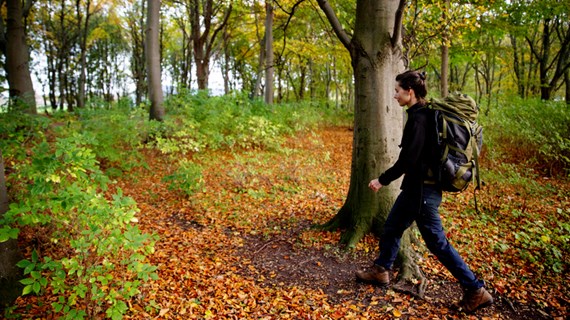
Right of Public Access
The Swedish Right of Public Access, or Allemansrätt, is fantastic! It gives everyone the opportunity to experience nature, allowing you to hike, cycle, canoe, pick berries and camp freely, with certain limitations of course. Around sensitive environments and private residences, it is important to show consideration for the landowners, animals, nature and other people. This is unique to Sweden, so it is our collective responsibility to preserve this ancient custom.
Recycling
Recycling
Recycling
In Sweden, recycling is a prerequisite and an important part of everyday life. It’s not just about reducing rubbish; it’s about taking shared responsibility for the environment and making small choices that contribute to a more sustainable future.

Marginal
How to recycle
Food waste
Please use the brown paper bags, which can be collected from the recycling building outside your residence or a recycling point. For example: fruit and vegetable peels, eggshells, seafood leftovers, coffee, tea bags, and kitchen paper.
Paper packaging
All smaller cardboard packaging, both hard and soft: please remember to flatten the pack. For example: milk cartons, egg cartons, corrugated cardboard, wrapping paper.
Plastic packaging
All smaller plastic packaging, both in hard and soft plastic: please ensure you rinse all plastic before it is recycled. For example: plastic bags, plastic bottles without a refund, bag-in-box bags, crisp packets, styrofoam, medicine blister packs.
Glass packaging
Glass bottles and jars are sorted as either clear or coloured glass. Please drain all liquids, remove lids and rinse first before recycling. For example: wine bottles, spices jars, jam jars.
Metal
All metal packaging, both hard and soft: please rinse all holders before recycling. For example: cans without a refund, tubes, caps, aluminium foil.
General/Residual waste
Unfortunately, all waste can’t be sorted. For example: chewing gum, envelopes, post-it notes, broken drinking glasses or ceramics, condoms, sanitary towels.
Grease
Cooking oil must not be poured into the sink since this will cause the pipes to clog. Instead, let it cool and pour it back into a plastic container.
Malmö as a rolemodel in recycling
Recycling in Malmö has developed steadily since the 1970s, establishing the city as a frontrunner in sustainable waste management. In 1973, the SYSAV waste-to-energy plant was launched, converting household waste into district heating and electricity. The Augustenborg district became a model for sustainable living, introducing local composting and, in 2008, piloting food waste separation for biogas production. This system was later rolled out across the city.
By 2014, it became mandatory for all households in Malmö to sort food waste, which is now used to produce biogas that powers buses and waste collection vehicles. The city has also taken steps to reduce construction waste through the reuse of building materials, aligning with circular economy principles. Malmö encourages residents to separate waste at source, and recycling stations are easily accessible across neighbourhoods. Schools and public campaigns have played a key role in raising awareness and fostering a culture of sustainability. The city also collaborates with local businesses to promote low-waste solutions and innovation. Today, Malmö continues to refine its recycling systems as part of its broader commitment to environmental responsibility and climate neutrality.
You can find a short explanation of the thinking behind it all on the Malmö city website.
Co-funded by the EU
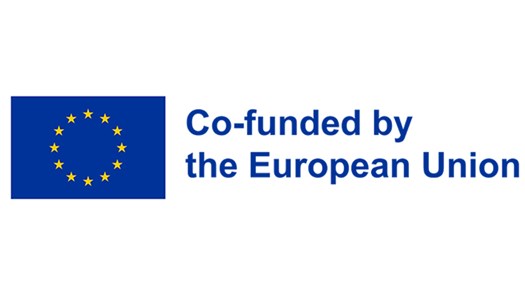
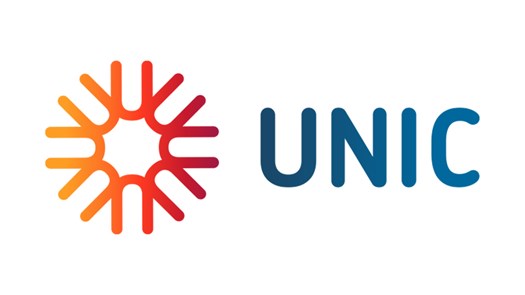
This guide has been created as part of UNIC – the European University of Cities in Post-Industrial Transition, a collaborative alliance of ten universities working to foster mobility, inclusion, and meaningful societal change. The initiative aims to strengthen collaboration between student-led "green societies" across Europe.


